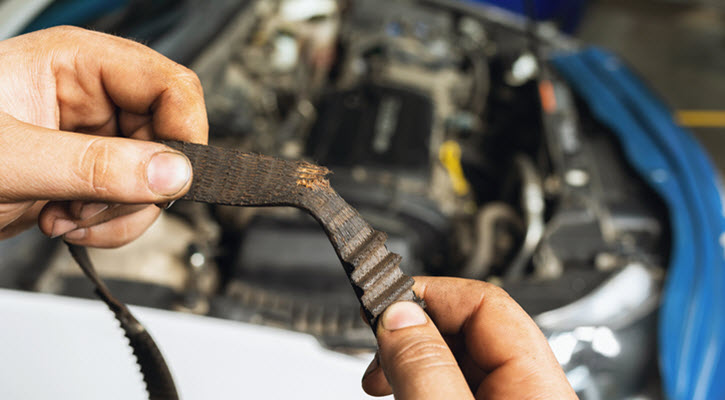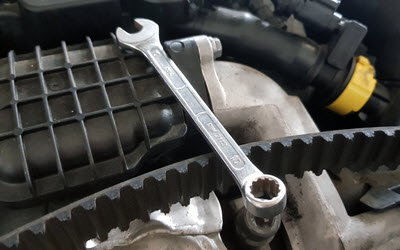
Call Our Experts When Your Mercedes Timing Belt Breaks in Santa Barbara
10 Jan, 23
The timing belt controls the function and timing of components like the camshafts, crankshaft, water pumps, fuel injectors, and alternators; all of which are essential for engine optimization and care. Without these parts working together at the same time as determined by your timing belt, it will be difficult to drive your vehicle.
Since the timing belt synchronizes the rotation of the crankshaft and the camshaft, ensuring that your Mercedes engine’s valves open and close at the proper times is important. If the timing belt fails, it can cause serious damage to the engine and potentially leave you stranded on the side of the road.
Look for These Warning Signs of Timing Belt Wear
There are several signs that a timing belt may be failing in your Mercedes-Benz vehicle. One of the most common is a noticeable decrease in engine performance. If the timing belt is not operating properly, the engine may struggle to achieve its full power output or may exhibit signs of misfiring.
Another potential sign of a timing belt failure is a loud, irregular noise coming from the engine. This can indicate that the timing belt is slipping or has become misaligned, causing the engine to run inefficiently. In some cases, the timing belt may even break completely, which can lead to a complete loss of power.
Timing belts are also prone to wear and tear over time. As the belt ages, it may begin to crack or show signs of fraying. This is especially common in vehicles with high mileage, as the timing belt is subjected to constant stress and wear. If you notice any visible damage to the timing belt, it is important to have it inspected and replaced as soon as possible to prevent further damage to the engine.
The Timing Belt Won’t Last Forever
There are several reasons why a timing belt may fail in a Mercedes-Benz vehicle. One common cause is a lack of proper maintenance. Timing belts should be replaced at regular intervals to ensure that they remain in good working order. If the timing belt is not replaced on schedule, it may wear out prematurely and fail.
Another potential cause of timing belt failure is exposure to extreme temperatures. If a timing belt is exposed to very high or very low temperatures for an extended period of time, it may become brittle and prone to breaking. This can be especially problematic in areas with extreme temperature fluctuations, as the timing belt may be subjected to a wide range of temperature extremes throughout the year.
In some cases, a timing belt may fail due to a manufacturing defect. If the timing belt is not made to the proper specifications, it may be prone to failure even with proper maintenance and use. If you suspect that a timing belt failure may be due to a manufacturing defect, it is important to contact the manufacturer and report the issue.
It is important to note that timing belt failure can lead to serious engine damage in a Mercedes-Benz vehicle. If the timing belt breaks while the engine is running, it can cause the valves to collide with the pistons, resulting in bent valves and potentially serious engine damage. In some cases, the engine may need to be completely rebuilt or replaced.
Santa Barbara Autowerks
To prevent timing belt failure  and the associated engine damage, it is important to follow the manufacturer’s recommended maintenance schedule for timing belt replacement. If you notice any of the signs of a failing timing belt, it is important to have it inspected and replaced as soon as possible by our mechanics. We will ensure your inspection is properly done, our results are transparent and honest, and our workmanship is high quality so you can count on us. By taking proper care of your timing belt, you can help ensure that your Mercedes-Benz vehicle continues to run smoothly and efficiently for many miles to come. Visit us from nearby communities in and around Santa Barbara, CA! We look forward to earning your repeat business for all your Mercedes needs in the future. Call us or stop by today.
and the associated engine damage, it is important to follow the manufacturer’s recommended maintenance schedule for timing belt replacement. If you notice any of the signs of a failing timing belt, it is important to have it inspected and replaced as soon as possible by our mechanics. We will ensure your inspection is properly done, our results are transparent and honest, and our workmanship is high quality so you can count on us. By taking proper care of your timing belt, you can help ensure that your Mercedes-Benz vehicle continues to run smoothly and efficiently for many miles to come. Visit us from nearby communities in and around Santa Barbara, CA! We look forward to earning your repeat business for all your Mercedes needs in the future. Call us or stop by today.




